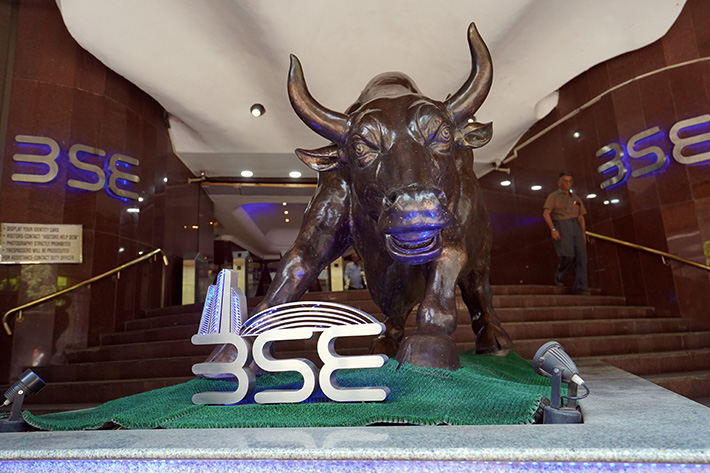India’s share markets could be poised for a glowing year ahead as their little-to-no reliance on the artificial intelligence boom would make them a reliable hedge against the technology, as it faces potential over-investment and sky high valuation, analysts say.
India’s benchmark indices Nifty 50 and BSE Sensex have significantly underperformed their Asian peers this year due to their limited exposure to AI, both rising around 8% so far.
In contrast, South Korea’s Kospi has risen a whopping 73%, while Taiwan’s weighted benchmark and Japan’s Nikkei have both rallied more than 20%.
Also on AF: ‘Big Short’ Wagers $1-Billion Bet That ‘AI Bubble’ Will Burst
Aside from the impact of a stubborn tariff fight with the United States, that underperformance has been down to the country’s lag in the AI-frenzy trade.
That same lag, however, could now turn India’s stock market into a shelter for global investors against a brewing anti-AI trade, fuelled by fears of a bubble.
Last week, HSBC noted in a report that while foreign investors had heavily gravitated towards AI names in Asia in recent months, “some of that was funded by cutting their exposure to India.”
“India is now the biggest underweight in GEM [Global Emerging Market] portfolios and only a quarter of funds we track are overweight India vs their benchmark,” the bank said.
But India is now “a good AI hedge” and a source of “diversification for those who feel uncomfortable with the AI rally,” it said.
“India will be an outsized beneficiary of any additional money coming into the EM region,” HSBC added.

That view has also been echoed by Macquarie’s Global Strategist Viktor Shvets, according to Indian journalist Maneka Doshi. Doshi cited a November 3 report by Shvets who said AI was “a world of a “Schrödinger’s Cat”, with no visibility of key economic and corporate drivers and the fear that burgeoning AI investment is looking like a bubble”.
That meant that while money was pouring into some Asian markets on the AI trade, it was also trickling back in to “most penalised markets” as a hedge, Shvets reportedly said.
Shifting sentiment
India has, indeed, been one such “penalised” market.
Its underperformance in Asia this year is the most in nearly three decades despite the country being the world’s fastest growing major market. It is also a stark contrast from last year when Indian equities were among the top three outperformers in Asia. The Nifty 50 index is also trading at a nearly 20% discount in valuation to the S&P 500, the worst gap in 17 years.
Foreign investors have responded to the AI gap by pulling funds from Indian equities. Between January and September, foreign investors sold $17.6 billion worth of Indian equities, their second-largest outflow on record for the period. In October, they bought up $1.66 billion in Indian equities, but then ended up pulling out $1.42 billion last week.

Still, a stronger-than-expected earnings season, planned reforms to improve access to foreign investors and early signs of improvement in consumer demand — including from record low inflation — are shifting sentiment on the country.
Goldman Sachs upgraded Indian equities to “overweight” from “neutral” last week, expecting 13-14% upsides in both Indian benchmarks by the end of 2026.
And a swing in sentiment on AI will only aid that shift in sentiment.
“India has never been an AI-driven market. It remains a domestically focused economy,” director-head of Equities Strategy at Standard Chartered Securities India, Sanjeev Hota, told Indian newspaper the Business Standard.
“Funds seeking short-term higher returns have moved to AI-heavy markets. If that trade begins to cool, we expect the money to flow back to India,” Hota said.
‘Bubble’ fears
Hota’s expectations of a possible cool down in the AI trade is backed by growing warnings of a global AI bubble and concerns about the industry’s valuations.
Reports this month from JP Morgan and the Bank of America paint a worrying picture with both saying companies will depend significantly on debt markets to support their growth. JP Morgan also noted that the AI industry will need to make $650 billion in annual revenue “into perpetuity” to deliver a 10% return on investments made until 2030.
Meanwhile, last month, speaking to CNBC, Microsoft cofounder Bill Gates also noted that an increasing over-investment in AI had meant the technology was a spot similar to the dot-com bubble of the late 1990s.
“The economic value [of AI] is extremely high, just like creating the internet ended up being, in net, very valuable,” Gates said. “But you have a frenzy. And some of these companies will be glad they spent all this money. Some of them, you know, they’ll commit to data centres whose electricity is too expensive.”
Gates’ Microsoft has invested $13 billion into OpenAI, and reported a $3.1 billion hit to its net income as a result of that investment. Meanwhile, OpenAI chief Sam Altman has also previously said the money being thrown at some players in the industry is ‘insane’ and ‘not rational’.
The latest results for BofA Global Research’s monthly fund manager survey show that global investors share those concerns. In the survey conducted last month 54% of investors said they thought that AI stocks were in a bubble compared with 38% who said they did not believe that a bubble exists.
Last month, The Bank of England also warned that global markets could tumble if investors’ mood sours on the prospects for artificial intelligence.
“The risk of a sharp market correction has increased,” the BoE’s Financial Policy Committee said in a quarterly update, in its sharpest warning to date of the dangers of an AI-triggered market slump.
- Vishakha Saxena
Also read:
$10bn in Outflows From Asian Stocks This Month as AI Rally Slows
SoftBank Q2 Profit Soars on OpenAI Bet, Sale of Nvidia Shares
AI Bubble Popped by MIT Report Noting Dismal Business Impacts
Altman Agrees the AI Market is a ‘Bubble’ That Could Soon Burst
AI is ‘Effectively Useless,’ Veteran Analyst Warns
Spotlight on Big Tech’s Power and Water Use Amid AI Surge`
DeepSeek Researcher Pessimistic About AI’s Impact on Humanity
























